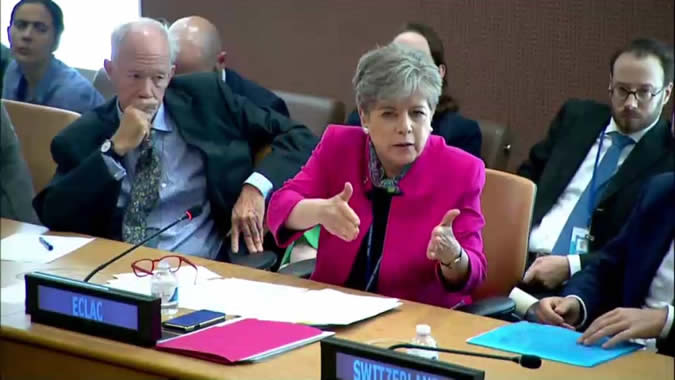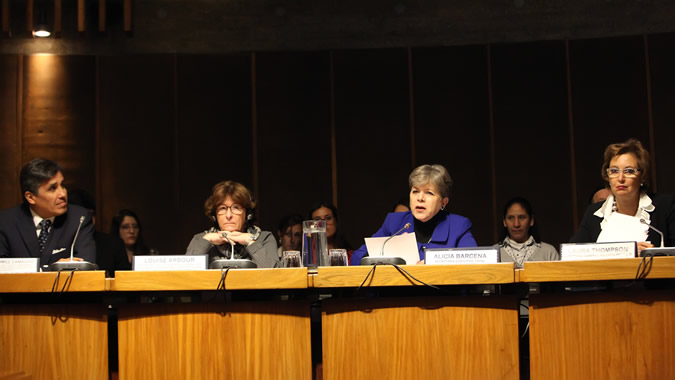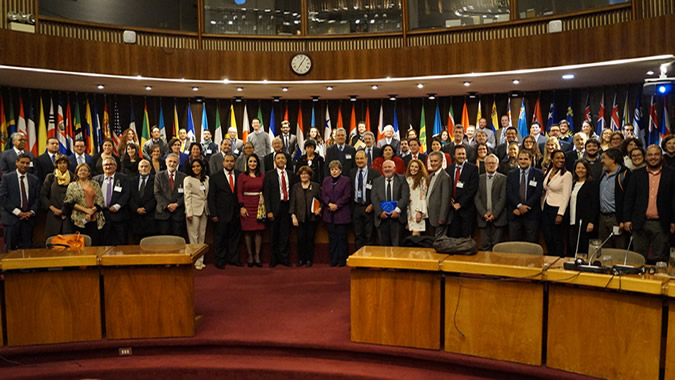ECLAC Calls for Reaffirming the Positive Contribution of Migrants with Evidence and Data
Work area(s)
ECLAC’s Executive Secretary participated in a meeting of the United Nations regional commissions on the prospects of the Global Compact for safe, orderly and regular migration.

The United Nations regional commissions must reaffirm migrants’ positive contributions to countries using evidence and data, Alicia Bárcena, the Executive Secretary of the Economic Commission for Latin America and the Caribbean (ECLAC), said.
The senior United Nations official participated in New York in a meeting of the multilateral body’s regional commissions on the prospects of the Global Compact for safe, orderly and regular migration.
Speakers at the event included the Prime Minister of Tuvalu, Enele Sopoaga; the Foreign Affairs Ministers of Bangladesh, Md. Shahidul Haque, of El Salvador, Hugo Martínez, and of Ethiopia, Workneh Gebeyahu; Zambia’s Planning Minister Lucky Mulusa; and the Assistant Secretary for Migrant Workers’ Affairs of the Philippines, Reynaldo Catapang.
Other speakers included Shamshad Akhtar, Executive Secretary of the Economic and Social Commission for Asia and the Pacific (ESCAP); Vera Songwe, Executive Secretary of the Economic Commission for Africa (ECA); Olga Algayerova, Executive Secretary of the United Nations Economic Commission for Europe (UNECE); and Mohammed Ali Alhakim, Executive Secretary of the Economic and Social Commission for Western Asia (ESCWA).
Additional participants in the meeting were Louise Arbour, the Special Representative of the Secretary-General for International Migration; David Malone, Rector of the United Nations University and Chair of the Global Migration Group; and Jürg Lauber, the Permanent Representative of Switzerland to the United Nations and Co-facilitator of the intergovernmental consultations and negotiations on the Global Compact for migration, along with Mexican national Juan José Ignacio Gómez Camacho, whom Lauber also represented today.
During her talk, Alicia Bárcena said that currently some 30 million Latin American and Caribbean persons live outside their countries of birth, which is equivalent to 4% of the region’s total population. Of those, 20 million live in the United States and 11 million are undocumented.
She indicated that there are three different realities in the region: that of Mexico and Central America, that of the Caribbean and that of South America.
“Mexico represents 40% of regional emigration, with some 12 million of its citizens living abroad. Colombia and El Salvador follow in terms of quantitative importance,” she said.
The Caribbean is a different story in which the majority of migrants are professionals, ECLAC’s Executive Secretary affirmed.
Meanwhile, South America – where the emigrant population totals 8.4 million people, just 2.1% of the total subregional population, and the immigrant population is 4.7 million, or 1.2% of the total subregional population – has set an example with the integration agreements of the Andean countries, the Common Market of the South (MERCOSUR) and the Pacific Alliance, which contemplate aspects associated with the free movement of its citizens.
Alicia Bárcena highlighted that migrants make an economic, social and cultural contribution to the countries they live in. For this reason, she said, ECLAC recommends gathering evidence of this contribution to guarantee migrants’ human rights, development and social inclusion.
“We must identify in what sector migrants most work and calculate their contribution, for example, in the construction field,” she said.
ECLAC’s most senior representative also referred to the first regional preparatory meeting on the Global Compact for safe, orderly and regular migration, which took place on August 30-31 at ECLAC’s headquarters in Santiago, Chile.
“The global compact is an unrepeatable process, it is an opportunity that the international community is called upon to take advantage of,” she said.
In his remarks, El Salvadoran Foreign Minister Hugo Martínez addressed the reality of Central American migrants and advocated for the human rights of his migrant compatriots and all migrant persons at a global level.
Martínez urged for respecting the rights of migrants, regardless of their migratory status, and called for ending stigmatization.
Finally, he advocated for the Global Compact to incorporate a gender approach and the concept of shared responsibility.
Related content

ECLAC and IOM Host Preparatory Meeting on the Global Compact for Secure, Orderly and Regular Migration
The meeting’s opening session was headed by Alicia Bárcena, ECLAC’s Executive Secretary; Louise Arbour, the Secretary-General’s Special Representative for International Migration; Ambassador Juan…

América Latina y el Caribe reafirma compromiso con Pacto mundial sobre migración
La primera consulta regional de expertas y expertos en migración internacional, organizada por la CEPAL y la OIM, culminó el jueves con un llamado a alcanzar un acuerdo global ambicioso, centrado en…
Country(ies)
- Latin America and the Caribbean
Contact
Public Information Unit
- prensa@cepal.org
- (56 2) 2210 2040